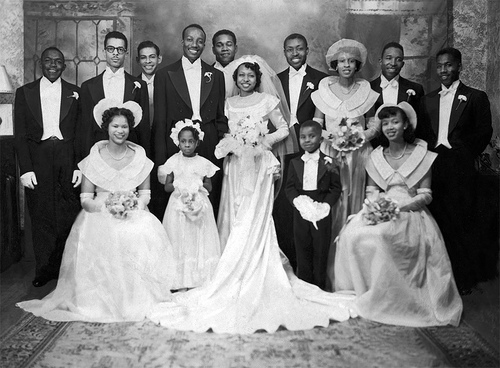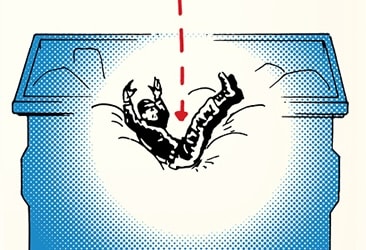
Marriage advice abounds these days, and I actually like that.
The abundance of advice either shows that we value this institution enough to make it the best it can be, or that we don’t know what the heck we’re talking about when it comes to marriage. But I’ll give us the benefit of the doubt and lean toward the former.
I’ve been married for 17 years now, and the practical wisdom that follows is nothing that originated with me. Rather, these are the 3 pieces of advice that others have passed along over the years that have stuck with me the strongest.
The advice applies to either spouse, yet I present it here to lay the burden on us men to be the ones who act first. I mean this as an exhortation for us to lead well, even if every relationship does not bear this out ideally.
Here are 3 ways to help build a strong and lasting marriage:
1. Understand that neither the husband nor wife sets the baseline of normalcy.
I received this advice about 2 years before I was married, from a friend of my father’s who specialized in marriage counseling.
He described how one of the biggest problems he sees in a marriage is whenever a husband insists that if only his wife would see things his way, then their marriage would become harmonious (or vice versa).
The problem is that one spouse is setting up his or her behavior as the baseline of normalcy.
If the other spouse’s actions or reactions deviate from this false baseline, then he or she is deemed the abnormal one.
See the problem?
The marriage counselor described how just like men and women’s physical bodies look different in overt ways, so too their psychological makeups are different. Men and women are equal in their intrinsic sense of identities and in their value as human beings, but they are different in how they approach the world.
The “right” approach is not the male way. Just the same way that the “right” approach is not the female way.
One of the best ways any spouse can love their partner is by seeing and appreciating these differences between the sexes, not pretending they don’t exist or fighting against them.
Let’s say a father wants to take the training wheels off his young son’s bike. But the mother resists, saying that the son is not old enough.
The father will do himself a disservice if he insists that his way is right, and that if only the mother would come around to his way of thinking, then their marriage would be harmonious.
It may well be that the mother is simply approaching the decision from a classically female perspective of wanting safety for her child, of nurturing her son. Whereas the father is approaching the decision from a classically male perspective of wanting independence for his son, of encouraging him to be adventurous.
The solution is to appreciate the differences in each spouse’s approach and talk it out together.
2. Realize that the union of marriage is not primarily about “ease.”
I received this advice about two weeks after I was married. As is common in new marriages, my wife and I had disagreed about something that seemed trivial to me — where to hang up wet towels — but had escalated to become a larger disagreement.
I phoned my best male friend, a guy I’ve known since high school days. Although we’re the same age, he was married 7 years earlier, so I figured he’d learned something along the way that I still needed to pick up on.
My larger complaint was that I thought marriage was going to be easier than it seemed. My wife and I were establishing a home together, and a home should be a place of restoration and comfort, not a place where we argued about towels, of all stupid things.
My friend challenged that idea. Certainly a home should become a place of peace, he said, but with all the intricacies of interpersonal communication and establishing a lasting marriage partnership, why would anyone expect a marriage to be easy — particularly when it’s just beginning?
Nothing else in life that’s worth doing happens without effort, he added. Graduating from university isn’t easy. Getting a job isn’t easy. Succeeding in a career isn’t easy. Becoming a good parent isn’t easy. These all take mindfulness, energy, and resilience, and there are learning curves to each new stage of life.
Instead of telling me that my wife was wrong and I was right, he gave me this gem of practical wisdom: “When it comes to disagreements in your marriage, always err on the side of caution.”
Meaning, the issue is not about wet towels. The issue is that their specific placement is something your wife values — for whatever her reasons. So if those wet towels are important to her, then don’t dismiss the issue casually. Instead, be cautious enough to realize that the kernel of the issue is something that means something to her.
In all matters of disagreement — even in something as seemingly small as where to hang wet towels — the solution is to proceed with carefulness, thoughtfulness, and attentiveness.
In a nutshell: seek to understand, rather than becoming annoyed.
3. Like a fine wine, marriage gets better with time.
This advice was given to me inadvertently by my grandfather, Bob Lynes, a Montana wheat farmer, before he passed away at age 87.
When my grandfather was in his mid-fifties, my grandmother became critically ill and was hospitalized for several months, which really shook my grandfather.
When her health returned and she came home, my grandfather said, “When I was a young guy, I might have been able to live without a wife. But these days, no way.”
As a rule, my grandfather was not known for saying much. But that line communicated volumes about his deeply abiding — and ever increasing — love for my grandmother. The story has been repeated within the family for years afterward.
What it tells me is that even though the love in some marriages disintegrates as the years go by, fortunately this isn’t always the case. Love can also increase and deepen as the years go by (and research backs up this observation). Spouses can become more appreciated, more necessary.
I was 29 when I was married, and back then I felt fairly self-sufficient in terms of my ability to function in the world as a single person. Sure, I appreciated and loved my wife when I married her. Yet today, at age 46, I find myself increasingly happy and content to be married and stay married — and even more so as I look to the future.
This isn’t to say I’ve become less independent or capable as time has gone on. It’s that I’ve come to greatly value the perspective and support my wife brings to the table. I’m far less apt to want to be single anymore. I’ve come to sincerely value marriage from the inside out.
Show her — and tell her — that she’s valued, particularly as the years go by.
If you’re a husband — or if you plan to be one someday, what will you do to communicate love to your wife? You yourself will benefit in the end.
I think of the advice laid down in a blanket principle communicated by Johnny Cash when describing his relationship with June Carter Cash.
Although both Johnny and June made mistakes along the way, and even though their marriage to each other wasn’t the first for either of them, they learned and grew from their mistakes. In the end, they enjoyed a deeply strong 35-year-marriage together.
June died in May 2003. Johnny was holding her hand when she passed. A few months later, Johnny himself died. People said he missed June so much he couldn’t bear the thought of being apart.
Earlier, when asked what made their marriage strong, Johnny offered this advice:
“There’s unconditional love there. You hear that phrase a lot, but it’s real with me and her [June]. She loves me in spite of everything, in spite of myself. She has saved my life more than once. She’s always been there with her love, and it has certainly made me forget the pain for a long time, many times. When it gets dark and everybody’s gone home and the lights are turned off, it’s just me and her.”
Unconditional love: perhaps the best thing any husband can give to his wife, any wife can give to her husband.
What’s the best piece of marriage advice you’ve received?
_______________________________
Marcus Brotherton is a contributing writer to Art of Manliness
Enjoy his debut novel, Feast For Thieves.
Tags: Marriage






